Will the Big States Please Stand Up?
California, Illinois, Florida and New Jersey should be applauded for mobilizing to hold earlier presidential primaries.WASHINGTON — Think of it as California’s revenge.
After years of watching as California’s financial heavy hitters were bled dry for campaign contributions that were spent elsewhere, the politicians of the nation’s largest state have decided to give its voters a say in selecting the Republican and Democratic presidential nominees.
And as befits a place that helped give birth to the Goldwater Right, the New Left, the counterculture, environmentalism, modern libertarianism and the tax revolt, California doesn’t mind if it throws an already flawed presidential nominating system into chaos.
Fearing that California will big-foot its way into dominance by moving its primary to Feb. 5, 2008, Illinois, Florida and New Jersey are maneuvering to do exactly the same thing. Thus would this diverse group of states give their voters a say just two weeks after the New Hampshire primary, three weeks after the Iowa caucuses, and also close to the contests in Nevada and South Carolina, which the Democrats have moved up in their order of battle.
There is a lot of hand-wringing about how the most open election since 1928 and the most important in many, many years — for once, that is not an exaggeration — will now be held hostage to the whims of big states, big fundraisers, big consultants and, as the first President Bush described momentum, Big Mo.
The money part could be ameliorated if Congress were only willing to update a public financing system that is several election cycles behind the realities of politics. Democrats in Congress who tout their populist and reform credentials while decrying the influence of wealthy interests should be moving with dispatch to do so.
As for the rest of the difficulties, there is another description of the supposed chaos: a rational response by political actors in a federal system doing their very best — given the incentives in place — to serve the interests of the voters in their respective states.
What should surprise us is that the big states did not move years ago to enhance their role in picking the nominees.
California was once a giant in the process. In the 1964 Republican primary, Barry Goldwater narrowly defeated Nelson Rockefeller and set the GOP on the rightward course it has pursued since. In 1972, California Democrats voted for George McGovern over Hubert Humphrey, confirming the importance of the antiwar forces in the party. Since then, California’s influence has been exercised largely by the people who can afford the fundraising parties at mansions in and around Los Angeles and San Francisco.
Moreover, the bulk of the states talking about moving their primaries forward promise to enhance the influence of two groups largely left out of the current process: the voters in big cities, and the vast group of suburban and exurban citizens so decisive to the outcomes of general elections.
Don’t get me wrong: I share the devotion to Iowa and New Hampshire’s conscientious voters that is a requirement for entry into the guild of political writers. I love watching candidates sit down with small groups of voters in living rooms in Epping, N.H., or Altoona, Iowa, and confront agonizingly thoughtful and detailed questions about healthcare policy or nuclear proliferation or whatever. And I love visiting both states, warm and welcoming as they are, with the excuse that I’m working.
But it’s time the method we use in selecting nominees bear some resemblance to how we elect them. It’s time the polyglot cities and the great exurban tracts gain a voice commensurate with their importance to the nation.
And it’s time that our candidates get tested early by broader electorates. Was it really good for the country that South Carolina’s Republicans put an effective end to the battle between George W. Bush and John McCain so early in 2000, on Feb. 19 to be exact? Was it helpful that the Democratic battle between Al Gore and Bill Bradley that same year effectively ended after New Hampshire voted on Feb. 1, or that John Kerry wasn’t tested harder in more places after his Jan. 27, 2004, victory there?
The revolt of the big states may not slow down the process, and might even enhance the importance of the outcomes in Iowa, New Hampshire and the two other early states. But by forcing themselves forward, California, Illinois, New Jersey, Florida (and who knows who else?) will definitely let many more voters, and many more kinds of voters, in on a very important choice. The legislatures in those states should ignore the complaints and let their people join the action.
E.J. Dionne Jr.’s e-mail address is postchat(at symbol)aol.com.
Copyright 2007, Washington Post Writers Group
Your support matters…Independent journalism is under threat and overshadowed by heavily funded mainstream media.
You can help level the playing field. Become a member.
Your tax-deductible contribution keeps us digging beneath the headlines to give you thought-provoking, investigative reporting and analysis that unearths what's really happening- without compromise.
Give today to support our courageous, independent journalists.
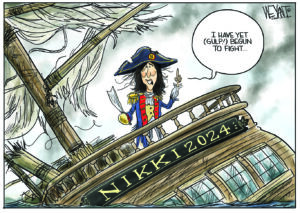
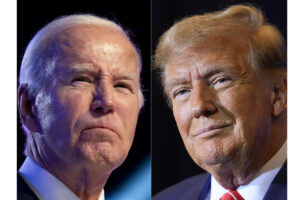
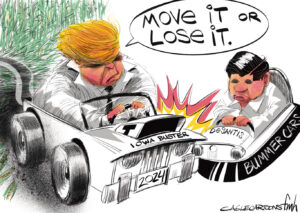
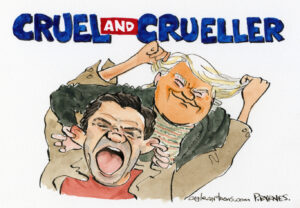
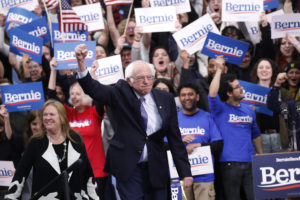
You need to be a supporter to comment.
There are currently no responses to this article.
Be the first to respond.